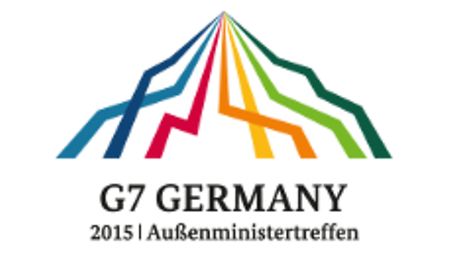By RAMESH JAURA
BERLIN (IDN) – In run-up to the four-week-long quinquennial review of the landmark Nuclear Non-Proliferation Treaty (NPT), the goal of a Middle East free of the weapons of mass destruction (WMD) and their means of delivery remains a distant dream. And so does the Helsinki Conference that should have been convened in December 2012. GERMAN | JAPANESE | NORWEGIAN
All indications are that also the Foreign Ministers of the Group of Seven (G7) influential countries of the world – Canada, France, Germany, Great Britain, Italy, Japan, and the United States – do not see a silver lining on the horizon. They met ahead of G7 summit June 7-8.
In a communiqué on April 15, they “commend the ongoing efforts of the Facilitator and co-sponsors of the 1995 Resolution (the Russian Federation, the United Kingdom and the United States), particularly the five rounds of consultations held among the regional States.”
But they “regret that, despite these efforts, it has thus far not been possible to convene the Helsinki Conference”.
The statement issued at their meeting in the northern German port city of Lübeck adds: “The regional parties must engage actively with each other in order to reach consensus on a date and an agenda for the Helsinki Conference as soon as possible. We emphasise that the Conference can only lead to a meaningful process if the interests of all participants are taken into account.”
The 1995 Resolution emerged from the NPT Review Conference, which called for “the establishment of an effectively verifiable Middle East zone free of weapons of mass destruction, nuclear, chemical and biological, and their delivery systems”.
The NPT entered into force in 1970, and 190 states have subscribed.
The proposal of a Weapons of Mass Destruction-Free Zone (WMDFZ) was first tabled by Egypt in 1990. It was based on longstanding calls to establish a Nuclear Weapons-Free Zone (NWFZ) in the Middle East. Both measures, intended to be pursued in parallel, rallied broad international support but practical progress has since been elusive.
In fact, on November 23, the U.S. issued a statement postponing the December 2012 conference. The conference has not yet been rescheduled, and the co-conveners have been offering different opinions as to when it should be held, and the reasons for the delay.
The U.S. statement cited “present conditions in the Middle East” and the lack of agreement by participating states on “acceptable conditions” for the December conference. No timeline for rescheduling was included.
In a November 24 statement, Russia called for the conference to be held before April 2013, citing that the preparations had already reached an “advanced stage” and that the reason for postponement was that not all states in the region agreed to participate in the conference.
At the time of the announcement, conference facilitator Jaakko Laajava, a Finnish diplomat had not yet secured Israel’s attendance. While Iran announced that it would attend on November 7, it also said it would not engage with the Israelis at the conference, and some experts believe Iran only announced it would attend because Tehran knew that the December 2012 meeting would not take place.
In protest of the postponement of the much awaited Helsinki conference, Egypt walked out of a NPT Preparatory Committee Meeting in Geneva on April 29, 2013, and called for it to be rescheduled as soon as possible.
As the U.S.-based Arms Control Association points out in a fact sheet, at the 2010 NPT Review Conference, state parties were able to agree for the first time to five practical steps to make progress towards implementing the 1995 NPT Review Conference Middle East resolution.
The United States, Russia and the United Kingdom, the treaty depository powers and sponsors of that Resolution, committed to work together with the UN Secretary General to convene a regional conference to discuss the issue in 2012.
Other measures agreed included the appointment of a WMDFZ facilitator as well as designation of a government that will host the conference. State parties will take up the question of the implementation of these steps at the subsequent NPT Review Conference in 2015. As the Lübeck communiqué implies, it is unlikely to happen.
Nevertheless, the Foreign Ministers of G7 countries, which include three permanent members of the UN Security Council – France, Great Britain and the U.S. – say they are “committed to seeking a safer world for all and to creating the conditions for a world without nuclear weapons in a way that promotes international stability and stresses the vital importance of non-proliferation for achieving this goal”.
They add: “Preventing the spread of weapons of mass destruction (WMD) and their means of delivery remains a top priority, since such proliferation poses a major threat to international peace and security. The fact that the uncontrolled proliferation of conventional arms is undermining stability in certain regions of the globe is a strong reason for the G7 to take action in this field as well.”
Regarding the upcoming ninth NPT Review Conference, which will be held 45 years after the NPT’s entry into force and 70 years after the atomic bombings in Hiroshima and Nagasaki and the end of World War II, the G7 “reaffirm” their “unconditional support for all three mutually reinforcing pillars of the NPT” – disarmament, nonproliferation, and peaceful uses of nuclear energy.
G7 Foreign Ministers point out: “The NPT remains the cornerstone of the nuclear non-proliferation regime and the essential foundation for the pursuit of nuclear disarmament in accordance with Article VI and the peaceful uses of nuclear energy. The NPT makes a vital and enduring contribution to making the world a safer place. It benefits its members on a daily basis.” [IDN-InDepthNews – 15 April 2015]
Image: Logo of the G7 Foreign Ministers’ Meeting in Lübeck © G7




